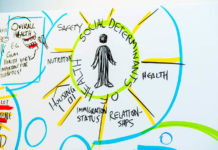Majority of Counselors Lack Training to Treat Racial Trauma, Study Finds
The percentage of clients who have experienced racial trauma far exceeds the percentage of counselors who are trained to identify and treat it.
Antidepressant Effects Thwarted by Stressful Environments
A new study, about to be published in the journal Brain, Behavior, and Immunity, investigates the role a stressful environment plays in antidepressant effectiveness....
Psychiatrist Who Revolutionized Family Therapy Dies at 96
From The Washington Post: Salvador Minuchin, the psychiatrist who played an instrumental role in pioneering family therapy, died on October 30th at age 96. Minuchin was...
Moving Schools Linked to Psychosis in Early Adolescence
Furthering findings that social adversity and urbanicity increase the risk of psychosis, research in Child & Adolescent Psychiatry finds that moving schools, family adversity,...
Storytelling Therapy for Trauma and Bullying
A study out of the University of Buffalo explores the use of Narrative Exposure Therapy to treat youth PTSD and substance abuse. “Trauma is...
Smoking in Pregnancy Linked to Risk of Schizophrenia Diagnosis in Later Life
In the first study of its kind, researchers from Finland found the “most definitive evidence to date” that smoking during pregnancy is associated with the eventual diagnosis of schizophrenia in offspring. After controlling for other potential variables, the study, published ahead of print in The American Journal of Psychiatry, revealed a 38% increased odds of developing symptoms diagnosed as schizophrenia in young adults who were exposed to high levels of nicotine in utero.
What is Loneliness And How Can it be Addressed?
As an increasing amount of research seeks to address the epidemic of loneliness, conceptual clarity is needed.
The Great Psychoanalysts 1: Donald Winnicott
From The Philosophers' Mail: Donald Winnicott, an English pediatrician and child psychoanalyst, deserves a place in history for drawing attention to the significance of parenting in...
Fighting for the Meaning of Madness: An Interview with Dr. John Read
Akansha Vaswani interviews Dr. John Read about the influences on his work and his research on madness, psychosis, and the mental health industry.
“Sugar May be as Damaging to the Brain as Extreme Stress or Abuse”
“The fact that drinking sugar or exposure to early life stress reduced the expression of genes critical for brain development and growth is of...
We Are All Adam Lanza’s Mother (& other things we’re not talking about)
I do not understand how we can continue to avoid the conversation about psychiatric medications and their role in the violence that is affecting far too many of our children, whether Seung-Hui Cho, Eric Harris, Kip Kinkel, or Jeff Weise (all of whom were either taking or withdrawing from psychotropic medications) or the scores of children and adults they have killed and harmed. It is not clear what role medications played in the Newtown tragedy, though news reports are now suggesting there is one.
Questions About Childhood Trauma And Schizophrenia Settled
In the first analysis of 30 years of studies, including 46 studies (selected from 27,000) involving 80,000 subjects, researchers in the U.K. and Australia...
Video: “How Childhood Trauma Can Make You A Sick Adult”
Dr. Vincent Felitti details the connection between childhood trauma and negative mental health outcomes in adulthood in a powerful video.
What Would a Trauma-Informed Society Look Like?
Imagine if we, as a society, started recognizing trauma, pain, grief, fear, the need for connection and understanding, and oppression without defensiveness or denial. What if, hypothetically, we saw the signs in people who were "defiant," "withdrawn," "oppositional," "depressed," "manic," or otherwise as desperate pleas to have their needs met, and stopped telling them they were sick for doing so? What would a society that actually encouraged expression of emotion, compassion, and empathy look like?
Remembering the Murder You Didn’t Commit
In this piece for The New Yorker, Rachel Aviv investigates how a psychologist and deputy sheriff convinced several suspects that they committed a murder, for which...
African American and Hispanic Youth Discontinue ADHD Treatment at Higher Rates than White Youth
Study examines racial and ethnic disparities in the quality of care for Medicaid-enrolled children starting ADHD medication.
“I am 16 and the Education System is Destroying my Health”
“This is an article about how our education system is ruining young people’s lives. Nobody is listening to the teachers who say it, so perhaps someone will listen to me,” sixteen-year-old Orli writes in the Guardian. “Nothing is so important that it’s worth risking your health over, not even the piece of paper you get, age 16, to tell you whether or not you’re good enough.”
Researchers Present Structural Competency Training Model for Psychiatrists
Researchers argue that a structural competency and social determinants of health approach must be made central to psychiatry training.
Review Finds Link Between Recession and Mental Health Issues
A literature review published in BMC Public Health by researchers from Portugal and the Czech Republic summarizes results from 101 studies investigating the effect...
Prenatal Prozac Alters Stress Response in Male Rats
Researchers from Belgium and the Netherlands, publishing online June 20 in Neuroscience, found that prenatal fluoxetine (Prozac) differentially affected the development of glucocorticoid receptors...
“Protect California Foster Youth from Dangerous Psychiatric Drugs”
The Santa Cruz Sentinel reports on legislation being passed in California to go after physicians who overprescribe psychiatric drugs to foster youth. The proposed legislation also targets government agencies that fail to offer nondrug alternative therapies to help foster youth recover from traumatic childhoods.
Does Facebook Use Improve Social Connections or Weaken Attention?
A network analysis of participants’ social media use and well-being reveals complex links with social capital but a minimal association with attentional control.
Self-Differentiation and Why it Matters in Relationships
From GoodTherapy.org: Research shows the tremendous impact we each have on one another's emotional and psychological health; our emotions, especially those that are negative, are...
Study Investigates Long-Term Effects of Social and Emotional Learning Programs
Social and Emotional Learning (SEL) programs have gained popularity in U.S. schools in recent years. A new study examines the nature and longevity of their impact on students.
Researchers Call for Transparency About Limits of Psychiatric Knowledge
A new paper explores how the disputed nature of psychiatric knowledge influences public perceptions and debates within the field of mental health.























